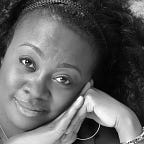“…a revolution in mutual understanding”: Race, Inclusivity, & Bonding Through Art
“(The goal is) a revolution in mutual understanding.” Audre Lorde
At the 2020 Women’s Theater Festival (WTF-Con), I facilitated a workshop called “What Do You See?” An interactive, improvisational storytelling experience, “What Do You See?” used photographs by African American photographers featuring African American subjects. Since one image can conjure many stories, participants were directed to examine the picture and tell a story about what they saw.
At first, people were afraid to tell an impromptu story based on a picture. Once they trusted that I was not pursuing any “gotchas”, they opened up, fearlessly free-styling storylines about the images on the screen. At the end of the impromptu storytelling, I retraced each image and gave them the backstory or context of the image. A picture of two little girls in fancy dresses was described as them being at a funeral, when, in fact, they were at a wedding. Another picture was of a father with his arms around his two sons. They described it as the father being fearful for his sons’ security, as opposed to him simply loving on his children.
The final image always trips up participants. It’s a picture of an oceanfront, white sandy stucco, multi-level dwelling with two external staircases winding down from the second level onto the main floor where there’s an opening in the wall the size of a door. The participants mislabeled it as a vacation home on the beach. Everyone is shocked when I reveal that it’s actually a slave castle located on the West African coast and that the opening in the wall was known as “the door of no return.” It is gut-wrenching for them to think that what they see as leisure is actually the beginning of generational trauma.
The purpose of the exercise, however, isn’t to shame participants. Nor is the intent to get them to cease telling stories centering on the African American experience. The purpose of the exercise is to show them how oftentimes there is the thing we see, and then there’s the truth.
Here are three things non-BIPOC folks can do to better understand the truth concerning their BIPOC neighbors and friends.
- Ask questions about things you see but don’t understand. While many of my fellow BIPOC friends fear being reduced to info-bots, the truth is we are better sources than Google. Some things we can chat about. Other times, for example, I direct curious friends and neighbors to read a book or an article, then meet for drinks to have a more robust discussion. This strategy helps to differentiate genuine and disingenuous seeker-searchers.
- Suspend the belief that most BIPOC folks are poor suffering souls. As a frame of reference, consider the following. The year of long gas lines, Iranian hostages, and the beginning of the crack epidemic in the Black community was also the year Michael Jackson released “Off The Wall” — a certified classic. Discos and block parties lit up as soon as we heard the first four beats of “Don’t Stop ’Til You Get Enough”. Yes, there is suffering in our community; in fact, there’s suffering all over the world. There are also reasons to celebrate.
- Support BIPOC artists. Multidisciplinary art preaches palatable sermons, serves up digestible content, and sweetens the experience of processing hard things. Also, art is part of the hope chest for all of humanity. Oftentimes, art is created for the sake of simply creating beautiful things — melodic music, feel-good productions, pretty paintings, and comedic theater, to name a few. Art also extends an on-ramp into BIPOC spaces, or pulls back the curtains and opens the window for you to watch and listen to the story of others.
The challenges we face en route to becoming, as the Constitution calls it, “a more perfect union” are not insurmountable. They’re hard, not impossible. Facing these challenges is important, profitable, and fruitful work — and also worth it. Art aids in our understanding of each other, but that’s only the beginning, for “what understanding begins to do,” according to Audre Lorde, “is to make knowledge available for use.”
#solutions #amoreperfectunion #liveart #RaleighNC
(Alexus Rhone is a writer, playwright, live events producer, and artistic theologian. She is co-producing “10-Minute Blooms,” a Black creatives showcase, Thursday, April 7, and Sunday afternoon, April 10. For https://www.eventbrite.com/e/10-minute-blooms-a-translation-of-feelings-into-language-tickets-302691708047. Discount code: BLOOMS)
